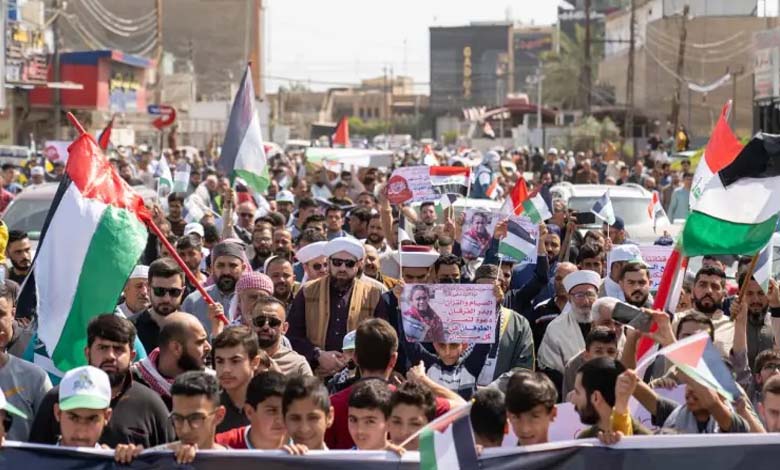Alliance of the Muslim Brotherhood, ISIS, and Al-Qaeda to Exploit the Gaza War

Attempts by the political Islamist movement to mobilize the Arab street in response to the Israeli war on Gaza have met with low levels of popular response, indicating a decline in its ability to regain its significance as a political force capable of influencing many regional issues.
A general sense of frustration has prevailed among Islamists who bet on attacks against Jewish communities, Western interests, and border incursions with Israel by their sympathizers, especially when it was confirmed that the recent armed clash on the Egyptian border was due to a thwarted drug smuggling attempt, not as was rumored, the participation of Egyptian militants supporting Hamas fighters.
The campaign launched by the pro-Muslim Brotherhood Islamist leader Mahmoud Fathy, titled “The Nation’s storm,” calling for a general strike in Egypt to commemorate the thirteenth anniversary of the January revolution, met with minimal response, with only a handful of participants.
The leaders of the Muslim Brotherhood hoped that a major event like Hamas‘s attack on Israeli targets on October 7th and the unprecedented Israeli response in Gaza would revive their popularity after years of decline, thus supporting their political agenda.
Islamists’ propaganda campaigns since the “Storm Al-Aqsa” operation aimed at delegitimizing some Arab regimes demonstrated the hope all factions of the political Islamist movement placed on this event to bring them back to the forefront as saviors of the nation from its deteriorating situation.
The will of the Islamists, who criticized all Arab countries for their lack of military intervention to save the residents of Gaza, collided with the shift in Muslims’ attitudes towards the required nature of religiosity in the years leading up to the October 7th attacks.
Jihadist Response
It is likely that the response to the campaigns launched by Islamists to support the Palestinians in Gaza will be limited to violent acts in the heart of Europe, due to the increasing influence of jihadists worldwide, while the political Islamist movement lacks organizational cover in some Arab countries amidst the current policies of openness.
There are favorable factors for the world’s main jihadist groups, ISIS and Al-Qaeda, to take the lead in exploiting the prolonged Israeli war on Gaza.
The policy of double standards adopted by Western countries and their support for Israel, which has exceeded in this war all previous violations of international laws and norms and human values, has deepened the resentment that these organizations seek to exploit.
In addition to their control over areas in Afghanistan suitable for preparation and training, ISIS and Al-Qaeda still have supporters around the world, ready to respond to calls for violence.
Since the beginning of the ongoing war in Gaza, several Western cities, including France, the United States, Germany, and Belgium, have witnessed terrorist attacks. Jihadists compete to gain the support of those whose hatred for the West has deepened due to the blatant bias towards Israel.
ISIS has seen the current regional changes as an opportunity to reinvent itself according to an expansion plan based on widening its targets under the slogan “Kill them wherever you find them,” exploiting the feelings of frustration and hatred that have spread among Muslims worldwide against some Western powers.
ISIS has exploited the events in Palestine differently from other organizations to neutralize them and show its superiority. It rejects fighting to liberate land or a homeland, advocating instead for fighting only to establish its caliphate and subjugate everyone to its rule.
ISIS confirmed that there is no difference between a government ruled by a secular Jewish constitution and another ruled by a secular Palestinian constitution, calling to fight under its banner as an entity seeking to apply Sharia and adhere to the divine constitution. Al-Qaeda, on the other hand, called for expanding the scope of the war to target everyone, including Jews worldwide.
ISIS aims to present itself as the only Islamic faction following the correct path that the community must adhere to, as the competition between it and Al-Qaeda for supremacy in global jihad intensifies.
Seizing the Opportunity
The timing of ISIS’s new strategy coincides with the noticeable confusion among competing Islamic factions and their inability to exploit the Palestinian cause to their advantage. This reflects its desire to seize the opportunity to revive itself through intensive operational activity, revealing the helplessness of other jihadist organizations and their reluctance to act during this critical phase for the nation.
This scenario repeats the events of 2000 and its aftermath when some Western researchers, foremost among them the Frenchman Gilles Kepel, author of the book “Jihad: The Trail of Political Islam,” thought that extremism had waned and focused on the Muslim Brotherhood. Months later, the world found itself facing the September 11, 2001 attacks planned and executed by Al-Qaeda.
Al-Qaeda exploited this period to spread its narrative and bolster the propaganda of its unprecedented operation that killed three thousand civilians during the second Palestinian Intifada in 2000, aiming to mobilize Arab and Islamic public opinion in its favor and deepen hatred against an America fully aligned with Israel.
The use of the Palestinian cause and the focus on America’s unconditional support for Israel gave a certain legitimacy to the September attacks among a segment of Arab and Islamic public opinion, which jihadists today plan to repeat in the context of the most brutal Israeli war against Gaza.
Despite the competition and ideological differences among jihadist factions and their lack of foothold in the Palestinian field, which limits their ability to seize the moment to revive their movement, the prolonged conflict, the growing anger among Muslims, and the political Islamist movement’s failure to mobilize the masses give jihadists the opportunity to take the lead, positioning themselves as the representatives of Muslims against the forces of unbelief.












